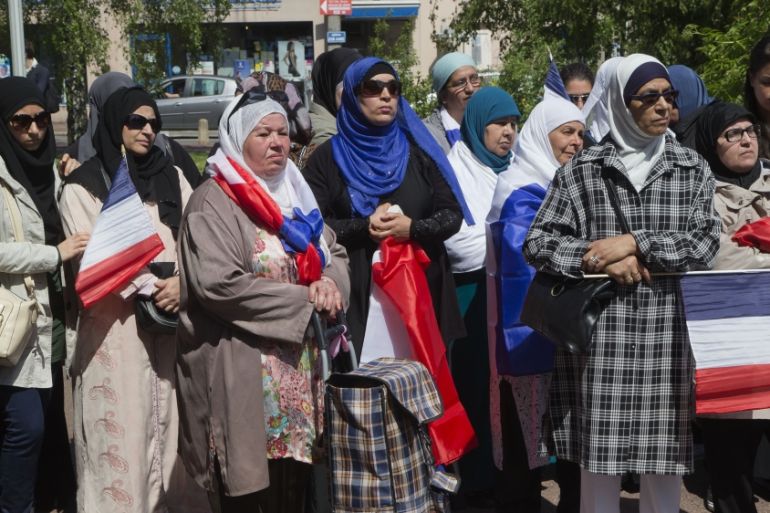Can the Muslim vote sway the French elections?
In case of a runoff between Marine Le Pen and another candidate, the Muslim electorate will rally behind her opponent.

Islam in France has been persistently in the spotlight of public attention during the past few years. Yet, during the 2017 electoral season, little attention has been paid to what Muslim voters are thinking in the run-up to the presidential elections.
With only a few days left before the first round of voting, questions about a potential “Muslim vote” that could be a decisive factor in the elections are worth exploring.
Keep reading
list of 4 itemsSummer Lee’s primary race tests fallout for critics of the US’s Gaza policy
Maldives votes in parliamentary elections amid India-China rivalry
Will India’s election be free and fair?
The Muslim electorate
Islam is the second biggest religion in France and Muslims make up about 5 percent of the French electorate, and approximately 8t percent of the overall population.
|
|
Surveys or studies based on citizens’ religion, race, or skin colour are prohibited by French law. Pollsters therefore often have to look at the patronymic surnames and geo-ethnic origins to identify the respondent’s religious affiliation. This has especially been the case when analysing French Muslim voters’ attitudes, particularly in the suburbs of cities such as Paris, Marseilles or Lyons, where there are a large concentrations of French citizens of North African origin.
In 2012, a study by the French Institute of Public Opinion (IFOP) showed that 86 percent of Muslim voters had voted for Francois Hollande, who won the elections with around 51 percent of the national vote. Estimated at 5 percent of the national electorate, Muslim voters thus constituted the needed vote that tilted the balance in favour of the socialist candidate.
This was the result of massive mobilisation in the suburbs of major French cities against Hollande’s opponent Nicolas Sarkozy, who had adopted tough rhetoric on Islam and who did not show any interest in countering the Islamophobia wave that had swept across France during his presidential mandate.
Although Islam and Islamophobia has temporarily taken a back seat in the run-up to the first round of the elections, giving way to various scandals and political bickering, it is unlikely that this will be the case in the second round.
OPINION: Why does Le Pen get so much support from young voters?
The question of Islam will occupy centre stage again and will probably trigger some fierce debates between the two runoff candidates, especially if the National Front’s Marine Le Pen makes it to the second round.
The presidential candidate facing Le Pen is likely to play the cards of multiculturalism and national unity, promising of socioeconomic development and implementing anti-discrimination laws, as well as other issues that can engage French Muslim voters.
Rallying the Muslim vote
For decades, French Muslims have traditionally voted for the left (Socialist and Communist Parties), motivated by the humanistic values that the left was supposed to uphold. But in recent decades Muslim voters (now second and third generation) have matured and their political leanings have become more diverse.
In the absence of a real mass political commitment to one political party or movement, French Muslims tend to be more interested in socioeconomic issues such as access to employment, benefits and discrimination, issues shared with the rest of the French population.
|
|
So, in theory, any candidate – with the exception of Marine Le Pen – who proposes realistic and attainable solutions and alternatives on these issues will be favoured by French Muslim voters, as well as other segments of society enduring similar socioeconomic conditions. In other words, the French Muslim voters’ electoral choice is not motivated by their religious affiliation but by the issues and concerns that affect their everyday life.
If there is one issue that unites the Muslim vote it would be the question of Islamophobia. It is therefore the positions that each of the candidates takes on this that can tip the balance in their favour.
That was exactly the case during the 2012 elections, when French Muslims voted massively in favour of Hollande simply because he promised to fight discrimination, racism and Islamophobia.
Today, practically all candidates promise to combat the social problems affecting minorities in the country, but their positions differ widely when it comes to Islam and Islamophobia.
For example, during the campaign for the primaries in 2016, Francois Fillon declared that “France had a problem with Islam” and that this religion threatened national unity.
This kind of rhetoric worries French Muslim voters because it stigmatises the Muslim population and makes it vulnerable and subject to even more criticism over its faith.
So while in the first round, the Muslim vote might get dispersed to different candidates, in the event of Le Pen making it to the runoff, the Muslim population will probably rally behind her opponent.
While the Muslim electorate in France is not a homogeneous and disciplined voting bloc given that it is driven by various socioeconomic considerations, there is a possibility that the Muslim vote will be a vote against the consolidation of the far right in French politics and the normalisation of Islamophobia, discrimination and ultranationalism in the French society.
Ali Saad is a French sociologist and media critic, focusing on the influence of mass media on society.
The views expressed in this article are the author’s own and do not necessarily reflect Al Jazeera’s editorial policy.
